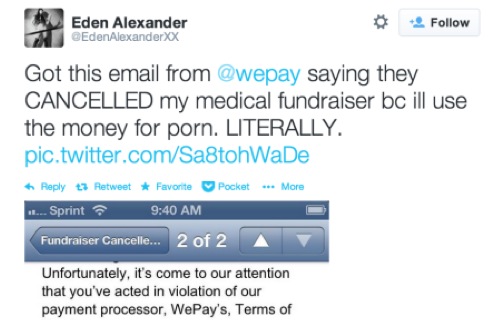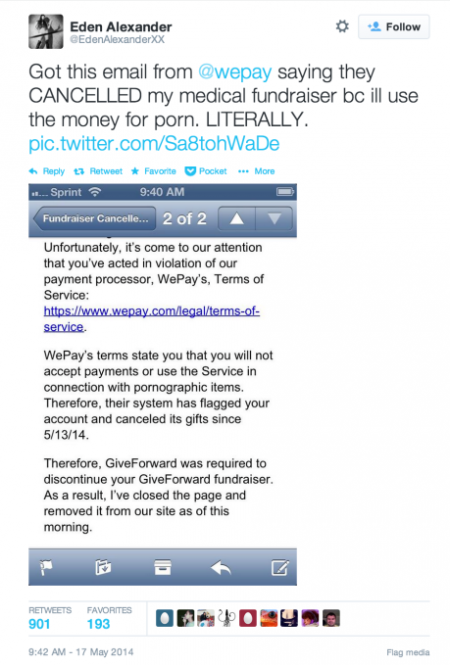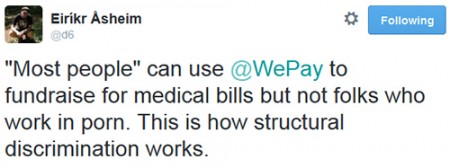“Risk is stigma in market terms,” writes PJ Rey, in a fine examination of WePay’s treatment of adult performer Eden Alexander, and the broader ramifications of structural discrimination for sex workers and members of marginalized groups —
Last week I wrote about how–despite their supposed libertarian principles–Wall Street and Silicon Valley firms (most notably, Chase and Amazon) had embarked on systematic campaigns of discrimination against sex workers, seemingly intent on expelling sex workers from the financial system. I concluded that discrimination propelled by market forces is no less reprehensible and no less deleterious in its consequences than discrimination driven by personal prejudice. And, I argued that we should hold accountable those who let a commitment to profit trump their commitment to fighting discrimination.
This weekend–almost as if to make a spectacle out of how vicious the campaign against sex workers has become–WePay took the unfathomably callous action of cancelling a fundraiser for Eden Alexander, a porn performer who experienced some very serious and acute health issues and was in desperate need of financial assistance to pay medical/personal care bills.
Alexander tweeted the cancellation notice that she received from WePay:
In pain and apparently shaken by the termination of what had seemed like her best hope to get care, Alexander made several disconcerting tweets then ceased communicating altogether. All indications are that she attempted or was close to attempting suicide and was taken away by paramedics.
Social media sites immediately flooded with outrage at WePay’s decision.








Okay, I have to take issue with blaming wepay, who has been very open about the topic. The issue was never that she works in the porn. The issue is that adult goods and services were offered in exchange for the donation. That turns them into an adult services payment processing company which opens up a whole can of worms, including: A) It now becomes their legal responsibility to make sure everyone paying them is over the age of 18. B) It now becomes their legal responsibility to make sure the content being distributed is not considered obscenity, e.g. it… Read more »
Right. And we all know that corporations are actually people too. They’ve got their reasons and within limits I’ll listen to them for about half a minute. The fact is that a minor mistake was made that, had it not involved sex or someone related to the porn business, would have been overlooked or merited a minor reprimand and a warning. Instead a person who is destitute and suffering in a way that’s difficult for anyone who hasn’t been there to imagine (Google the conditions for which she’s being treated – you’ll be duly horrified) is cut off from people… Read more »
Oh there’s definitely a double standard. The obsenity laws are in my opinion a violation of free speech. If I write an erotica that covers certain things, no harm is coming to anyone and only those who want to read it will, so for it to be illegal is absurd. But even though many of our laws have a history in puritanical bullshit, they are the laws and if wepay knows adult goods are being exchanged for donations through their system, they are at legal risk. From what I read, they are willing to work with her with a new… Read more »
Ahhhh…no. That is NOT the issue at all. The point is that a woman raising funds for a medical condition requiring life-saving treatment was essentially persecuted and denied those funds solely because some private bureaucrats didn’t like her chosen profession. The excuse that she retweeted independent actors offering adult services as an inducement to donate is simply a convenient ruse to justify the act of persecution. The fact remains that nowhere did Eden Alexander ever violate WePay’s Terms of Service herself, and WePay’s action in terminating her account amounts to simple fundamental cold-hearted thievery…not to mention, if such acts had… Read more »
It’s not because they didn’t like her profession, it’s because she retweeted an offer for adult content in exchange for donations, thus making them a payment processing service for adult content.
I feel for her, I do, but that’s what happened.